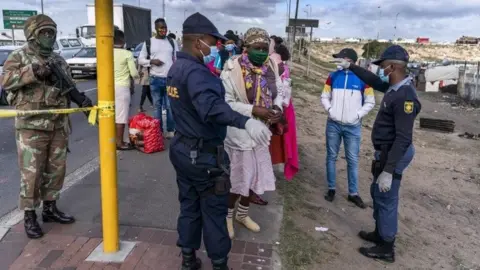Coronavirus in Africa: Outbreak 'accelerating' across continent
 EPA
EPAThe coronavirus pandemic is accelerating in Africa, the World Health Organization (WHO) says.
The WHO's Africa regional director Matshidiso Moeti said it was spreading beyond capital cities and that a lack of tests and other supplies was hampering responses.
But she said that it did not seem as if severe cases and deaths were being missed by authorities.
So far Africa has been the continent least affected by Covid-19.
South Africa had more than a quarter of the reported cases and was seeing high numbers of confirmed cases and deaths in Eastern Cape and Western Cape provinces, Dr Moeti told a briefing at WHO headquarters in Geneva.
She added that Western Cape was looking similar to recent outbreaks in Europe and the US.
The country has one of the most advanced healthcare systems in Africa, but there are fears that a steep rise in cases could overwhelm it.
South Africa's government has been praised for its early and decisive imposition of a lockdown, but the easing of restrictions in June has been accompanied by a rise in infections.
Overall, there have been more than 7.3 million infections globally and more than 416,000 deaths.
Dr Moeti said that Africa had had some 200,000 cases and 5,000 deaths, with 10 countries accounting for 75% of the cases.
"Even though these cases in Africa account for less than 3% of the global total, it's clear that the pandemic is accelerating," she said.
She warned that cases were likely to continue increasing for the foreseeable future.
"Until such time as we have access to an effective vaccine, I'm afraid we'll probably have to live with a steady increase in the region, with some hotspots having to be managed in a number of countries, as is happening now in South Africa, Algeria, Cameroon for example, which require very strong public health measures, social distancing measures to take place," Dr Moeti said.

Why healthcare experts are so worried
By Anne Mawathe, BBC Africa Health editor
While the virus has spread more slowly in Africa than other parts of the world, the spread to rural areas is concerning.
There are two reasons why health policy experts are worried about the spread of Covid-19 in rural and informal settlements.
Healthcare systems in most parts of the continent are concentrated in urban centres, while the testing capacity in many countries is still low.
The initial steps that the continent took in testing at points of entry and tracing continue to work in its favour. Coupled with its youthful population, the continent has so far managed to avoid the fast spread witnessed in the US and some European countries.
But the pandemic is now spreading quickly in Africa. It took 98 days to reach the initial 100,000 cases.
By contrast, it has taken just 18 days to double from 100,000 to 200,000.
There are a couple of ways to explain this. First, some countries have eased lockdowns. Returning to business as usual without proper mechanisms in place to control the spread of the disease could hamper the progress made so far.
Another factor is that some countries have increased their testing capacity and are reporting more confirmed cases.
The caveat is that governments need to increase their testing capacity so that there is a clearer picture of just how many people have contracted the virus.

- A SIMPLE GUIDE: How do I protect myself?
- WHAT DOES IT DO TO THE BODY? Doctors on the front line explain
- GLOBAL SPREAD: Tracking the pandemic
- VIDEO: The 20-second hand wash
- STRESS: How to look after your mental health
